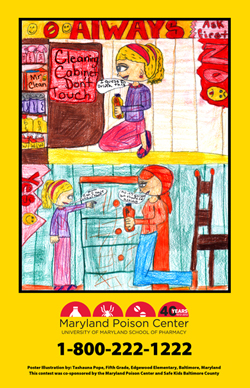National Poison Prevention Week Raises Awareness About Poison Safety and Prevention
The Maryland Poison Center offers tips to keep families safe throughout the year.
By: Malissa Carroll
Monday, March 11, 2013

Each year, thousands of children and adults in the United States are poisoned by common household products, including medicines, cleaners, garden and automobile products, and personal care products. In 1961, President John F. Kennedy named the third week in March as National Poison Prevention Week (NPPW) to raise awareness about the dangers of these unintentional poisonings. This year, NPPW will be observed March 17-23.
According to the Centers for Disease Control and Prevention, 87 people die and another 2,277 are treated in emergency rooms each day as a result of unintentional poisonings. In 2009, poisoning was the second leading cause of unintentional injury and death, behind only motor vehicle crashes. More than 90 percent of those poisonings occurred in a person's home.
The Maryland Poison Center (MPC), part of the Department of Pharmacy Practice and Science at the University of Maryland School of Pharmacy, is a 24-hour telephone service that offers free, fast, and confidential expert advice about poisonings and overdoses. Certified by the American Association of Poison Control Centers as a regional poison center, the MPC has provided poisoning treatment advice, education, and prevention services to Marylanders since 1972.
This year, the MPC has partnered with Safe Kids Baltimore to celebrate NPPW by offering poison prevention kits to Baltimore City Schools. Safe Kids Frederick County is also working with the MPC to host a poster contest with select after-school programs. The contest winner will be announced later this month.
Although half of the calls received by the MPC involve children younger than six years old, teens, adults, and seniors are also at risk for poisoning. Follow these tips to prevent poisonings in your home:
- Keep the poison center phone number close at all times. Program the number in your cell phone. A poison center can be reached from anywhere in the United States by dialing 1-800-222-1222.
- Read and follow directions on the label before using medicines and household products.
- Follow the Poison Safety Checklist to make sure all medicines, poisons, and harmful household products are stored out of the sight and reach of children.
- Keep all household products and medicines in their original containers. Never put chemicals or cleaning products in empty food or drink containers.
- Always ask for medicine in child-resistant containers, but remember that these containers are not child-proof. If given enough time, children can often open the safety caps.
- Know the names of plants in and around your home. Remove poisonous plants from the house and yard.
- Teach small children never to touch or taste something unless they ask an adult.
- Put medicines away after each dose, even if they will be taken again in a few hours.
- Have a carbon monoxide alarm in your home if you have a fireplace, wood burning stove, or other gas appliances.
Families in the state of Maryland who would like more information about poison prevention are invited to request a Mr. Yuk packet for their homes. This packet contains poison safety information, Mr. Yuk stickers, telephone stickers, and a magnet that can help families prevent or prepare for poisoning emergencies.